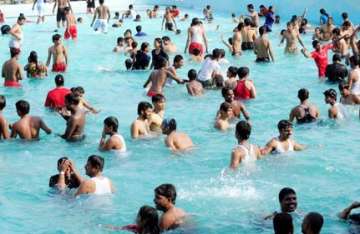Negative outcomes can occur when disinfection byproducts, critical to prevent outbreaks of infectious disease of recreational pools, form reactions with organic matter in pool water. File Photo: Nagara Gopal
A dip in the pool on a hot summer day might not be as safe as you thought-the application of disinfectants in recreational pools can lead to asthma and bladder cancer, according to a recent University of Illinois study.
Not only is swimming fun, but it's also a popular form of exercise in many countries.
Thus, disinfection of recreational pools is critical to prevent outbreaks of infectious disease. However, Michael Plewa, University of Illinois professor of genetics, said negative outcomes can occur when disinfection byproducts form reactions with organic matter in pool water.
Pool water represents extreme cases of disinfection that differ from the disinfection of drinking water as pools are continuously exposed to disinfectants.
“All sources of water possess organic matter that comes from decaying leaves, microbes and other dead life forms. In addition to organic matter and disinfectants, pool waters contain sweat, hair, skin, urine, and consumer products such as cosmetics and sunscreens from swimmers,” said Plewa.
These consumer products are often nitrogen-rich, causing concern that they may contribute to the generation of nitrogenous disinfection byproducts, Plewa added. When mixed with disinfectants, these products may become chemically modified and converted into more toxic agents. These disinfection byproducts can mutate genes, induce birth defects, accelerate the aging process, cause respiratory ailments, and even induce cancer after long-term exposures.
In this study, collections from public pools and a control sample of tap water were evaluated to identify recreational water conditions that could be harmful to your health.
The study compared different disinfection methods and environmental conditions. Results proved that all disinfected pool samples exhibited more genomic DNA damage than the source tap water, said Plewa.
“Care should be taken in selecting disinfectants to treat recreational pool water. The data suggest that brominating agents should be avoided as disinfectants of recreational pool water. The best method to treat pool waters is a combination of UV treatment with chlorine as compared to chlorination alone,” advised Plewa.
Latest India News
